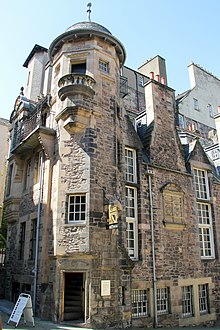Makar (literature)
Makar is a Scottish literary term for poets, especially during the Renaissance (15th and 16th centuries). Central poets that count are William Dunbar , Bishop Gavin Douglas , Robert Henryson and King James I as well as Richard Holland , Blind Hary , Walter Kennedy . They wrote in Middle Scottish and were influenced by Geoffrey Chaucer (therefore also called Scottish Chaucerians), who established Middle English as a written language in the Middle Ages.
They took ancient materials and partly translated works of ancient poetry (Henryson Aesop , Douglas the Aeneid ) and renewed the language and poetry through influences from France, Italy and Latin. The language ranges from courtly, English-adapted and Latinized form ( Aureate English ) to popular dialect with Zoten and vulgar language. The topics range from elaborate allegories, grotesque comedy with a Celtic (Gaelic) touch, abusive poems (flyting in the form of the exchange of mutual abuse by two competitors) to satires with a very realistic touch. A center of this Scottish renaissance was the court of James IV.
Later Makar from the 16th century are David Lyndsay , Jacob VI. , Alexander Montgomerie and Alexander Scott .
The word has the same root word as Maker in English (Macher) and is spelled that often. The plural is Makaris or Makeris.
The temporary post of city poet in Scotland is known as Makar in cities like Edinburgh. The official title of the Poet Laureate of Scotland, which has existed since 2004, is known as Scots Makar. Edwin Morgan was the first to win this award .
Web links
Individual evidence
- ↑ Particularly known between William Dunbar and Walter Kennedy, which also deal with the contrast between poetry in Gaelic (then called Irish by Dunbar) and English (Scottish)
- ↑ Scottish Government 2004 on Morgan as the first Scots Makar
